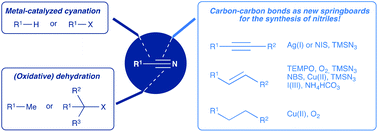Chopping unfunctionalized carbon–carbon bonds: a new paradigm for the synthesis of organonitriles†
Abstract
In the last year, a new strategy for the synthesis of organonitriles, whether aliphatic or aromatic, has emerged based on the direct carbon–carbon double or triple bond cleavage of alkenyl or alkynyl precursors. This Highlight mainly focuses on the efforts made, often nearly simultaneously, by three research teams that shaped the implementation of this new paradigm, which should be of great value for the synthetic community facing the ever-growing demand for new organonitriles, especially in medicinal chemistry.

- This article is part of the themed collections: Reviews & Highlights in Organic Chemistry Frontiers for 2014 and In Celebration of Max Malacria’s 65th Birthday

 Please wait while we load your content...
Please wait while we load your content...